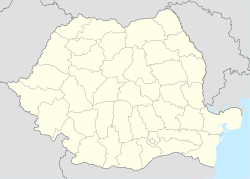Mălâncrav (village)
Mălâncrav | |
|---|---|
Village | |
| Coordinates: 46°13′N 24°39′E / 46.217°N 24.650°E | |
| Country | Romania |
| County | Sibiu County |
| Time zone | UTC+2 (EET) |
| • Summer (DST) | UTC+3 (EEST) |

Mălâncrav (German: Malmkrog, Hungarian: Almakerék) is a village in the commune of Laslea in Sibiu County, Transylvania, Romania. An asphalt road of 13 km leads to the village. In the formerly majority Transylvanian Saxon village, there still is a small community of Saxons.
The route of the Via Transilvanica long-distance trail passes through the village.[1]
History[edit]
The Saxon Romanesque Lutheran church has early 14th-century Gothic murals in the apse, with 15th-century murals in the nave and a 15th-century late Gothic altar. They constitute some of the most significant Gothic murals in Transylvania aside from those at Ghelința in Covasna County. In later centuries the Apafi family (descending from a certain Saxon man named Apa;[2] later a leading Hungarian noble family in Transylvania) buried their dead in the church, since they had overlordship in the village.[citation needed] In 1902, the tomb chest of György Apafi, father of Mihaly Apafi, and his family was transferred to the Hungarian National Museum in Budapest.[3]
The village was not part of the traditionally autonomous Saxon territory, although it had a majority ethnic German population until the 1970s.[citation needed]
In media[edit]
The film Malmkrog (2020) has been named after the village and was shot at the Apafi manor.
Gallery[edit]
-
Exterior
-
15-century altar
-
The apse
-
Mark the Evangelist
-
Murals
-
Jesus with the Cross
-
Holy Hungarians, Bishop Gellert, Ladislaus I of Hungary, Unknown, Stephen I of Hungary, his son Holy Prince Emericus
-
Mural
-
Murals
-
Murals
46°13′N 24°39′E / 46.217°N 24.650°E
References[edit]
- ^ "Terra Saxonum | Via Transilvanica". www.viatransilvanica.com (in Romanian). Retrieved 2023-08-14.
- ^ Teutsch, Georg Daniel (1850). "Beiträge zur Geschichte Siebenbürgens unter König Ludwig I. 1342 - 1382" [Contributions to the History of Transylvania under King Louis I (1342-1382)]. Archiv für Kunde österreichischer Geschichts-Quellen (Archive for the Study of Austrian Historical Sources). 5. Vienna: Austrian Academy of Sciences, History Commission: 322-365 [see p. 362]. Retrieved 19 July 2021.
{{cite journal}}: Cite journal requires|journal=(help) - ^ Mérai, Dóra (2017). Memory from the Past, Display for the Future: Early Modern Funeral Monuments from the Transylvanian Principality (PDF) (Thesis). Budapest: Central European University. p. 73. Retrieved 19 July 2021.












